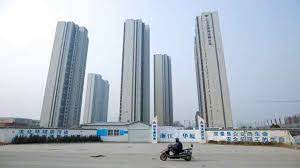BEIJING (Reuters): Property sales by floor area in China fell 6.8 per cent year-on-year in January-October, compared with a 7.5pc slide in the first nine months of 2023, suggesting China’s property sector is yet to emerge from its slump.
Property investment in the first 10 months of 2023 fell 9.3pc from a year earlier, after dropping 9.1pc in January-September, according to data from the National Bureau of Statistics (NBS) released on Wednesday.
New construction starts measured by floor area fell 23.2pc year-on-year, after a 23.4pc slump in the first nine months.
Funds raised by China’s property developers were down 11.0pc year-on-year after a 13.5pc fall in January-September.
FACTORY OUTPUT, RETAIL SALES UP IN OCTOBER
China’s October economic activity perked up as industrial output grew at a faster pace and retail sales growth beat expectations, an encouraging sign for an economy still showing significant pockets of weakness despite a flurry of support measures.
The world’s second-biggest economy has struggled to mount a strong post-COVID recovery as a deepening property crisis, local government debt risks, slow global growth and geopolitical tensions have dented momentum.
China’s industrial output grew 4.6pc in October year-on-year, accelerating from the 4.5pc pace seen in September, data from the NBS showed, beating expectations for a 4.4pc increase in a Reuters poll. It also marked the strongest growth since April.
Retail sales, a gauge of consumption, rose 7.6pc in October, quickening from a 5.5pc gain in September and hitting the fastest growth since May. Analysts had expected retail sales to grow 7.0pc due to the low base effect in 2022 when COVID curbs disrupted consumers and businesses.
Some analysts struck a cautious note on the upside data surprise, noting that the property sector remains a weak link for the economy and pointed to the lack of major reforms as another impediment to sustainable longer term revival.
“Due to the impact of holidays and low base effect in 2022, year-on-year figures cannot reflect the actual momentum of the economy,” said Xing Zhaopeng, senior China strategist at ANZ.
He said month-on-month figures suggest economic momentum has further weakened with “increasing deflationary risks”.
Even trips made during the eight-day Golden Week holiday earlier in October missed government estimate as economists say consumers are concerned about their jobs and income growth in an uncertain employment market.
The nationwide survey-based jobless rate stayed at 5.0pc in October, unchanged from September, the NBS data showed.
China has been ramping up efforts to revive its post-COVID economy with a slew of policy support measures in recent months, although these steps have provided only modest benefits so far.
Wednesday’s upbeat data comes as a raft of other indicators for October released over recent weeks pointed to muted growth momentum. While imports grew unexpectedly, exports shrank at a quicker pace, household borrowing remained weak, consumer prices swung lower while factory deflation persisted for the 13th straight month.
The country’s central bank, People’s Bank of China (PBOC), boosted liquidity injections but kept the interest rate unchanged when rolling over maturing medium-term policy loans on Wednesday, matching market expectations.
In a rare revision last month, the government also lifted its 2023 budget deficit to around 3.8pc of gross domestic product from 3pc to account for the planned issuance of 1 trillion yuan ($137.10 billion) in sovereign bonds.
The PBOC has cut banks’ reserve requirement ratio (RRR) twice this year to free up liquidity to aid the economic recovery. Analysts widely expect another RRR cut in the final months of this year.
China’s crisis-hit property sector has yet to see a meaningful rebound despite strengthened support measures for homebuyers, including relaxing of home purchase restrictions and lowering in borrowing costs. The government plans to provide at least 1 trillion yuan of low-cost funding to the urban village renovation and affordable housing programmes, Bloomberg News reported on Tuesday, citing people familiar with the matter.
Fixed asset investment expanded 2.9pc in the first 10 months from the same period a year earlier, versus expectations for a 3.1pc rise. It grew 3.1pc in the January-September period.







